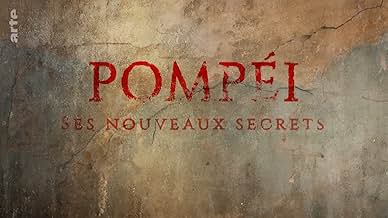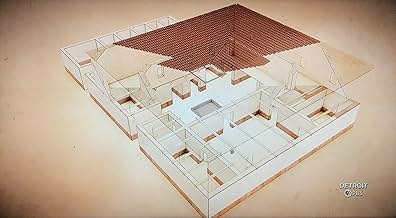IMDb-BEWERTUNG
7,7/10
232
IHRE BEWERTUNG
Hier wird die umfangreichste archäologische Ausgrabung in Pompeji seit über einer Generation gezeigt.Hier wird die umfangreichste archäologische Ausgrabung in Pompeji seit über einer Generation gezeigt.Hier wird die umfangreichste archäologische Ausgrabung in Pompeji seit über einer Generation gezeigt.
Folgen durchsuchen
Empfohlene Bewertungen
I just watched the first episode and I loved it! I thought the illustrations they used were beautiful (in the style of ancient frescoes) and a nice touch. I enjoyed seeing the variety of experts, such as the volcano guy and construction workers who were able to lend the insights of their trade--fascinating to see how it hasn't changed in thousands of years, but moreover I enjoy hearing from different disciplines. I liked how the theories evolved over time instead of staying static. I often find in history documentaries the theories would be static and the process to those conclusions wasn't shared, but here I felt like we got a better insight into their process and more information as to why they drew these conclusions. Excited to see the next two instalments!
The story of Pomepeii, the Roman city preserved through its own destruction, will never cease to be fascinating. Much of the site remains unexcavated: modern standards mean work proceeds slowly, and one thing that stands out in this account of the biggest dig for years is quite how modest the objectives are: the uncovering of just one small city block. Even so, the dig still uncovers frescos (famously, one appearing to depict a pizza!), marble tables, reliefs, a mosaic floor, a fireplace and skeletons. The documentary breaks no new ground stylistically, but the literal breaking of ground it depicts keeps the attention nonetheless.
There is not enough material to justify 3 one-hour-long episodes.
The first episode already exhausts most of what they could reveal about the new dig-site, and starting in episode two, they begin to fill the time with completely unsupported speculation about the emotions of the people of Pompeii, and interpret outrageous stories into arbitrarily chosen small details - again without supporting evidence.
This is then further worsened by unnecessary and annoying BBC-narrator-style commentary of experts that are unaffiliated with the dig and just hog screen-time and -space rambling on about emotional and impactful topics and have no relevance beyond wowing emotionally unstable viewers into some sort of reaction.
There are better documentary series, this is not one of them.
The first episode already exhausts most of what they could reveal about the new dig-site, and starting in episode two, they begin to fill the time with completely unsupported speculation about the emotions of the people of Pompeii, and interpret outrageous stories into arbitrarily chosen small details - again without supporting evidence.
This is then further worsened by unnecessary and annoying BBC-narrator-style commentary of experts that are unaffiliated with the dig and just hog screen-time and -space rambling on about emotional and impactful topics and have no relevance beyond wowing emotionally unstable viewers into some sort of reaction.
There are better documentary series, this is not one of them.
Pompeii, the new dig
I was irritated from the starting credits, the narrator spoke as if everything was so amazing despite everyone knowing about Pompeii, and they have been digging there since the 1740's, hardly new is it! Who was she speaking to, I have no clue.
The music irritated and so much time was wasted looking at unremarkable finds, we found a skeleton in a house, oh it's all so amazing, it was a disaster people died. I found this approach deeply patronising, if not antagonising, they should have sent Mary Beard to bring the romans back to life.
What really drove me mad was revisionist tropes on Roman society, I cannot believe it, this pathologist said she wanted to find out how this person died, duh! Volcanic eruption in 79AD. 30 mins in and we had seen nothing, learnt nothing from the new dig that we hadn't seen in the old dig, no explanation of finds, and the finds they showed us were most banal.
I think the approach of this series of programmes lacked history, the most casual comparison with Margaret Mountford's similar show reveals this series deficiencies in stark relief.
Episode 2 showed promise, establishing that largely the population of Pompeii had fled to surrounding towns and this is why there were no carts found in Pompeii Streets etc
Episode 3 plummeted again to the depths, of a 45 minute program we were 15 minutes in and we had seen nothing new, it was all padding and recap. We then had some strangest historian look at a charcoal drawing and then stating the drawer must have attended the amphitheatre in Pompeii, he must possess supernatural powers to deduce this, talk about overinterpretation
We were shown a whole array of objects that were not part of the new dig and were discovered years ago.
The whole showed lacked any proper historical analysis, the so called experts made inane comments, gladiators were the equivalent to footballers today, the population of Pompeii would not have known what a volcano was despite the Roman Empire lasting 1000 years and covering the known world.
At best this is a 3 out of 10 the whole thing needs redoing properly.
I was irritated from the starting credits, the narrator spoke as if everything was so amazing despite everyone knowing about Pompeii, and they have been digging there since the 1740's, hardly new is it! Who was she speaking to, I have no clue.
The music irritated and so much time was wasted looking at unremarkable finds, we found a skeleton in a house, oh it's all so amazing, it was a disaster people died. I found this approach deeply patronising, if not antagonising, they should have sent Mary Beard to bring the romans back to life.
What really drove me mad was revisionist tropes on Roman society, I cannot believe it, this pathologist said she wanted to find out how this person died, duh! Volcanic eruption in 79AD. 30 mins in and we had seen nothing, learnt nothing from the new dig that we hadn't seen in the old dig, no explanation of finds, and the finds they showed us were most banal.
I think the approach of this series of programmes lacked history, the most casual comparison with Margaret Mountford's similar show reveals this series deficiencies in stark relief.
Episode 2 showed promise, establishing that largely the population of Pompeii had fled to surrounding towns and this is why there were no carts found in Pompeii Streets etc
Episode 3 plummeted again to the depths, of a 45 minute program we were 15 minutes in and we had seen nothing new, it was all padding and recap. We then had some strangest historian look at a charcoal drawing and then stating the drawer must have attended the amphitheatre in Pompeii, he must possess supernatural powers to deduce this, talk about overinterpretation
We were shown a whole array of objects that were not part of the new dig and were discovered years ago.
The whole showed lacked any proper historical analysis, the so called experts made inane comments, gladiators were the equivalent to footballers today, the population of Pompeii would not have known what a volcano was despite the Roman Empire lasting 1000 years and covering the known world.
At best this is a 3 out of 10 the whole thing needs redoing properly.
Top-Auswahl
Melde dich zum Bewerten an und greife auf die Watchlist für personalisierte Empfehlungen zu.
Details
- Erscheinungsdatum
- Herkunftsland
- Offizieller Standort
- Sprache
- Auch bekannt als
- Pompeii: The New Dig
- Drehorte
- Produktionsfirmen
- Weitere beteiligte Unternehmen bei IMDbPro anzeigen
- Farbe
Zu dieser Seite beitragen
Bearbeitung vorschlagen oder fehlenden Inhalt hinzufügen

Oberste Lücke
By what name was Pompeji, Geschichte einer Katastrophe (2024) officially released in India in English?
Antwort

















